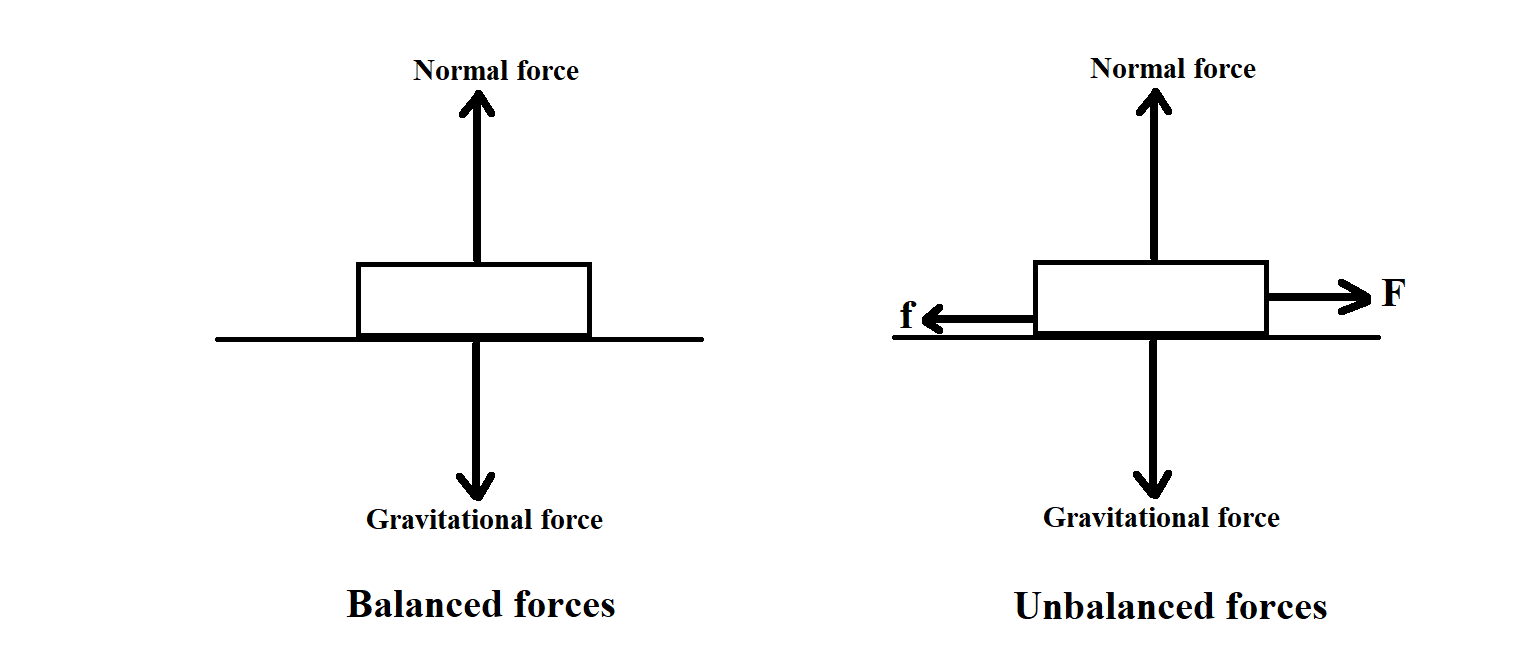
An unbalanced force:
A. Never tends to change the state of motion of the body
B. Tends to change the state of motion of body
C. Never exists
D. Does not provide acceleration to body
Answer
598.2k+ views
Hint: Forces acting on a body can be of two types, equal and opposite forces, that can cancel each other’s effect and net effect on body becomes zero; other one is the pair of forces which do not cancel each other’s effect and can bring some change in the state of motion of body. We will study both types of forces to find the correct answer.
Complete step by step answer:
Force is defined as any interaction, when unopposed, will change the motion of an object. A force can cause an object with mass to change its velocity; also it can cause an object to begin moving from the state of rest. Force can make an object to accelerate. We can also say that a force is a pull or push that acts upon an object and as a result of which the object interacts with its surroundings. SI unit of force is Newton. Its base unit is $Kgm{{s}^{-2}}$.
Forces can be of two types:
Balanced force and Unbalanced force.
If two individual forces acting on a body are of equal magnitude and opposite direction, then the forces are said to be balanced. In case of balanced force, the body continues to be in its position, that is, it might continue moving with the same speed and in the same direction or can stay at its initial position.
If an individual force is not balanced by a force of equal magnitude and opposite direction, then the body is said to be acted upon by an unbalanced force. In case of an unbalanced force, a body can change its position; a moving body can either change magnitude of its velocity or can also change the direction of motion. A moving body can come to rest also.

Forces that can cause a change in the motion of an object are called unbalanced forces.
Hence, the correct option is B.
Note: While dealing with unbalanced forces, it is necessary to know that the individual forces may be acting in opposite directions, but to be called as unbalanced forces, their magnitude should be different. Similarly, the magnitude of two individual forces may be equal, but to be called as unbalanced forces, they should not be acting in the opposite direction. Unbalanced forces tend to change the state of motion of the body they are acting upon.
Complete step by step answer:
Force is defined as any interaction, when unopposed, will change the motion of an object. A force can cause an object with mass to change its velocity; also it can cause an object to begin moving from the state of rest. Force can make an object to accelerate. We can also say that a force is a pull or push that acts upon an object and as a result of which the object interacts with its surroundings. SI unit of force is Newton. Its base unit is $Kgm{{s}^{-2}}$.
Forces can be of two types:
Balanced force and Unbalanced force.
If two individual forces acting on a body are of equal magnitude and opposite direction, then the forces are said to be balanced. In case of balanced force, the body continues to be in its position, that is, it might continue moving with the same speed and in the same direction or can stay at its initial position.
If an individual force is not balanced by a force of equal magnitude and opposite direction, then the body is said to be acted upon by an unbalanced force. In case of an unbalanced force, a body can change its position; a moving body can either change magnitude of its velocity or can also change the direction of motion. A moving body can come to rest also.

Forces that can cause a change in the motion of an object are called unbalanced forces.
Hence, the correct option is B.
Note: While dealing with unbalanced forces, it is necessary to know that the individual forces may be acting in opposite directions, but to be called as unbalanced forces, their magnitude should be different. Similarly, the magnitude of two individual forces may be equal, but to be called as unbalanced forces, they should not be acting in the opposite direction. Unbalanced forces tend to change the state of motion of the body they are acting upon.
Recently Updated Pages
Master Class 10 Computer Science: Engaging Questions & Answers for Success

Master Class 10 General Knowledge: Engaging Questions & Answers for Success

Master Class 10 English: Engaging Questions & Answers for Success

Master Class 10 Social Science: Engaging Questions & Answers for Success

Master Class 10 Maths: Engaging Questions & Answers for Success

Master Class 10 Science: Engaging Questions & Answers for Success

Trending doubts
What is the median of the first 10 natural numbers class 10 maths CBSE

Which women's tennis player has 24 Grand Slam singles titles?

Who is the Brand Ambassador of Incredible India?

Why is there a time difference of about 5 hours between class 10 social science CBSE

Write a letter to the principal requesting him to grant class 10 english CBSE

A moving boat is observed from the top of a 150 m high class 10 maths CBSE




